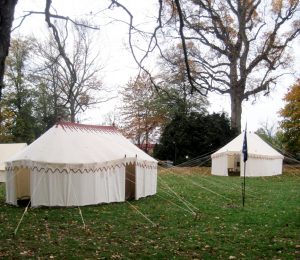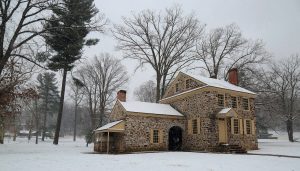The 1820 Missouri Compromise allowed Missouri to become a slave state, established Maine as a free state, and banned slavery in the territory west of Missouri. The same year saw the first organized emigration of Blacks from the United States back to Africa, from New York to Sierra Leone. In 1822, Denmark Vesey, a free Black, organized an unsuccessful slave uprising in Charleston, South Carolina, while at the same time segregated public schools for Blacks opened in Philadelphia. Two years later Liberia, on the west coast of Africa, was established by freed American slaves. And in 1825 Hannah Till, who had served George Washington for several years during the American Revolution, died in Philadelphia.
Despite the growth of racism in the nineteenth century, and that many Americans did not know African Americans fought for the cause of independence during the American Revolution (or were willfully ignorant on the matter), a small number of aged Black veterans received some recognition for their service. The largest cohort was those who, like their white comrades, received veterans’ pensions, and perhaps some notoriety in their own community. A few were recognized in newspapers, and one in a book, before or after they died.
Gen. George Washington’s wartime military household had a retinue of cooks and other servants, white and black, free and enslaved, with several supervisors to oversee the whole. Few are known at all beyond mention in the household accounts. The best-known is William “Billy” Lee, the commander-in-chief’s body slave; his biography is included in Douglas R. Egerton’s Death or Liberty: African Americans and Revolutionary America.[1]
Hannah Till’s story, while not as comprehensive, is nonetheless fascinating, as much by what was set down on paper as for what can be read between those lines. A notice of her death read:
1825—Died at Philadelphia, Mrs. Hannah Till, a black women, who had been cook to General Washington and General La Fayette, in all their campaigns during the war of Independence. The latter at my instance went to see her, at No. 182 South Fourth street, when he was here in 1825, and made her a present to be remembered.[2]
Historian John F. Watson wrote of her:
Hannah Till

This is the name of a black woman whom I saw in March, 1824, in her 102d year of age—a pious woman, possessing a sound mind and memory, and fruitful of anecdote of the Revolutionary war, in which she had served her seven years of service to General Washington and La Fayette, as cook, &c. I saw her in her own small frame house, No. 182, south Fourth street, a little below Pine street. Her original name was Long Point—a name given her father for his successful conflict with a buck at that place near Smyrna. She was born in Kent county, Delaware. Her master, John Brinkly, Esq. sold her at the age of 15 years, when she was brought to Pennsylvania. At 25 years of age she was sold to Parson Henderson, and went with hi m to Northumberland. At 35 years of age she was sold to Parson Mason, of New York, with whom she dwelt there until the war of the Revolution; she then bought her freedom, and with her husband was hired into General Washington’s military family as cooks—serving with him in all his campaigns for six and a half years, and for half a year she was lent into the service of General La Fayette. With one or the other of these she was present in all the celebrated battles in which they were engaged. She could speak, in a good strong voice, of all the things she saw in her long life, with better recollection and readier utterance than any other narrator with whom I have had occasion so to converse. I inquired regarding the domestic habits of Washington and others: she said he was very positive in requiring compliance with his orders; but was a moderate and indulgent master. He was sometimes familiar among his equals and guests, and would indulge a moderate laugh. He always had his lady with him in the winter campaigns, and on such occasions, was pleased when freed from mixed company and to be alone in his family. He was moderate in eating and drinking. I asked if she knew that he prayed. She answered that she expected he did, but she did not know that he practiced it. I was the more particular in this, because I had heard directly from Isaac Potts, the public Friend at Valley Forge, that he actually saw him, by chance, at prayer in the bushes at or near his place. I asked her if he ever swore; she answered, that ideas about religion were not very strict, and that she thought that he did not strictly guard against it in times of high excitements, and that she well remembered that on one provocation with her, he called her c—d [colored] fool. General La Fayette she praised greatly—said he was very handsome, tall, slender, and genteel, having a fair white and red face, with reddish hair—that he spoke English plain enough—was always very kind. Her words were very emphatic:—`Truly he was a gentleman to meet and to follow!’
As I was interested in the narratives of this old black woman, I thought she might afford some gratification to Gen. La Fayette himself again to see her; I made him therefore acquainted with the leading facts. As I never saw either of the parties afterwards, I may add from the communications of my sister who knew her and visited her occasionally, especially in her 104th year. She says she received from her questions, such answers as these—‘I well remember the arrival of the specie to pay the French army, for the house was so crowded that day that my pastry room was used to lodge the specie in, even while she still used the room. She continued with Washington till after Andre the spy was hung. On that day she saw many tears shed by our officers.’General La Fayette called on her with Messrs. [Tench] Tilghman and Biddle [likely Clement or Nicholas]. To his question, Where was you when General Washington left Morristown? she answered, I remained more than six months with you, Sir, in the same house. He left her, promising to send her money by his son. The sequel was, that her house was embarrassed for arrear groundrents, and she was soon after informed to make herself easy, for La Fayette had cleared it off! and ‘the pious old soul blesses you and him for the interference.’More was said, but it might savour of gossip to say more in this article. She has since gone to her reward.[3]

(National Park Service)
Hannah Till was married to Isaac Till. They are recorded to have had seven children: Andrew Till, born circa 1761; John Till, born circa 1765; Sarah Till, born circa 1771; Daniel Till, born between 1775-1795; Philip Till, born 1775-1795; Isaac Worley Till, born 1778, and William Till, born 1780-1790. One son was born during the Valley Forge winter: “Isaac Worley Till son to Hannah a free Nigroe woman in full Communion with the Church was born in Gen: Washingtons Camp Valey forge nineteen months ago and baptized in this 4th Sabbath of Augt. 1779.” Isaac’s birth would have occurred in January or February 1778, at which time Hannah was likely about forty to forty-five years of age. Records indicate that Hannah purchased her freedom in December 1778, eight months prior to her son’s baptism.[4]
[1]Douglas R. Egerton’s, Death or Liberty: African Americans and Revolutionary America (New York: Oxford University Press, 2009), 3-14. Washington’s household supervisors and staff fluctuated during the war, but various records provide some insights. Edgerton writes of a relatively large retinue:
The record of servants at Headquarters for the year 1776, while probably not entirely complete, furnishes us with the following names in addition to those mentioned in the preceding year: Patrick McGuire, who came from Philadelphia to act as steward and served from May, 1776, until March, 1778; Hannah [Till], the negro servant of Rev. John Mason; she was to receive 40s. a month which were to be left in the hands of Captain Gibbs until £58 had accumulated, after which she was to receive her wages herself to be applied to the purchase of her freedom; Servant Jack and Sailor Jack [these two appear to be different individuals]; Margaret Thomas, who did sewing in February, 1776, and washing from October, 1776, to February, 1778; Negro James; Stephen Sims; Negroes Lydia, Jenny, Cato, and Isaac [Till, husband of Hannah], the latter a servant of Captain John Johnson, of Bergen county, New Jersey. He was to receive 40s. a month of his wages of £7; he also cooked for Washington from June, 1777, to June, 1780; John and Frank, hostlers; a Mrs. Lake and Peggy. John Whitehead also served at Headquarters from April, 1776, for one year at a wage of $5 per month.
The known African American servants were Hannah and Isaac Till, Negro James, “Negroes Lydia, Jenny, Cato.” Given their names and titles, Servant Jack and Sailor Jack were also likely black. A record of payments made by Washington to Mary Smith again mentions Hannah and Sailor John/Jack, as well as Black Polly:
“His Excellency G. Washington to Mary Smith
To 3 months wages for the cook at 40/ £6 – –
To 1 month & 5 weeks wages for Hanah a 20/ 1-5-
To 2 months for black polly a 18/ 1–16–
To 1 month for Mary 20/ 1 –
To 1 month for Mrs Wilson 16/ –16–
To 3 months for White Polly 16/ 2–8–
To 4 Pigs 9/ 1–14
To cash paid for the freight of the Camp kettles 15–1
To Cash paid Sailor John 17
New York 10thJuly. 1776 £ 16–9–1
Received ye Above account in full Mary Smith”
General George Washington’s Accounts of Expenses, 1775-1783 (While Commander-in-Chief of the Continental Army 1775-1783, Reproduced in Facsimile with Annotations by John C. Fitzpatrick) (Boston and New York: Houghton Mifflin Company, 1917), 35-36. Mary Smith to George Washington, 10 July 1776, Revolutionary War Accounts, Vouchers, and Receipted Accounts 1, George Washington Papers, series 4, General Correspondence, 1697–1799, Library of Congress, Presidential Papers Microfilm (Washington, D.C.: Library of Congress, 1961).
[2]John F. Watson, Annals of Philadelphia and Pennsylvania, in the Olden Time, two volumes (Philadelphia: Published by Whiting and Thomas, 1856), 1: 601.
[3]John F. Watson, Annals of Philadelphia, being a collection of memoirs, anecdotes, & incidents of the city and its inhabitants (Philadelphia: For Sale by Uriah Hunt, 1830), 352-353.
[4]Isaac Worley Till baptismal record, 2nd Presbyterian Church, Arch and 3rd Streets, Philadelphia, Pennsylvania. C.R. Cole (with Charles L Blockson), “Hannah Till Mother of Isaac Woorley Till,” (Daughters of the American Revolution, commemorative marker research, 2015). “‘Lately apprehended in the first Maryland regiment …’: African American Women with the Continental Army,”www.academia.edu/38515415/_Lately_apprehended_in_the_first_Maryland_regiment_African_American_Women_with_the_Army.











Recent Articles
Dr. Warren’s Crucial Informant
John Dickinson and His Letters
North of America: Loyalists, Indigenous Nations, and the Borders of the Long American Revolution
Recent Comments
This is a great article demonstrating that historians' further research can add...
Very comprehensive research. Good work.
Saying that the term "Empire of Liberty" had genocidal connotations is, in...